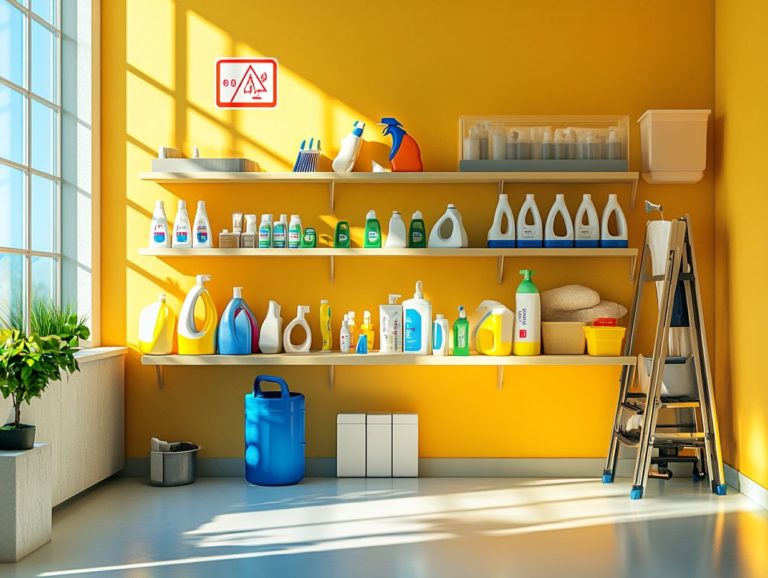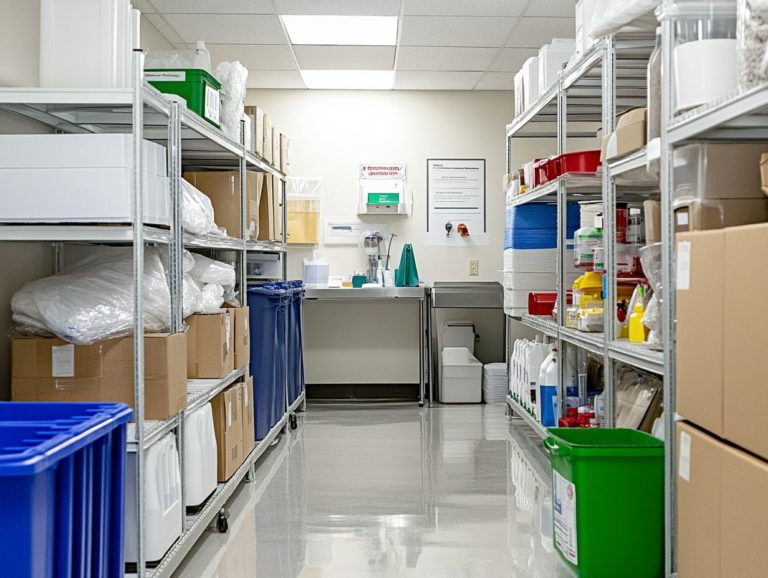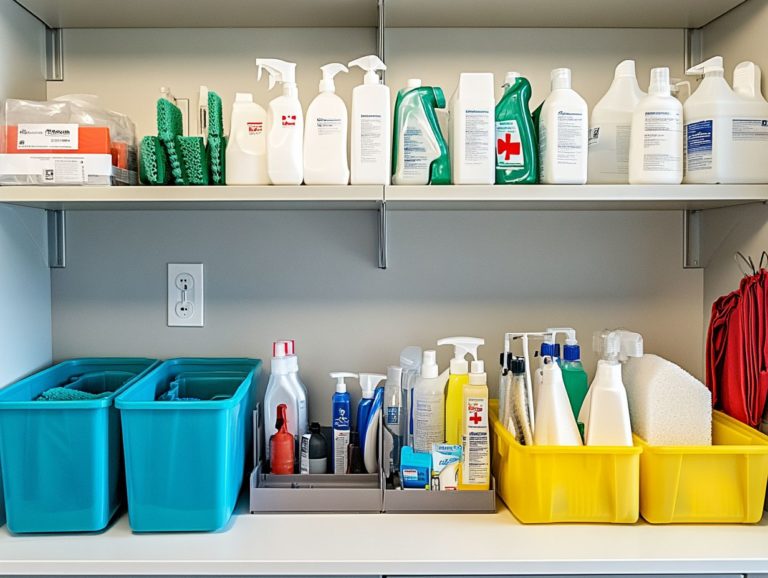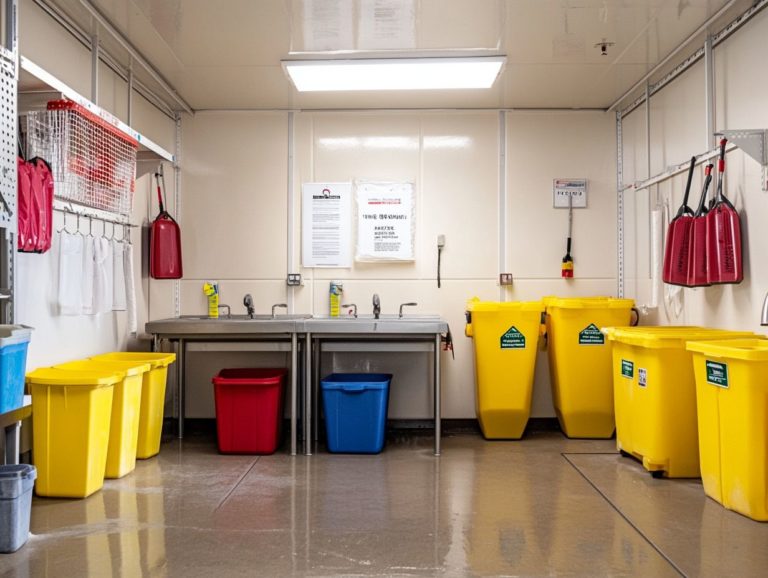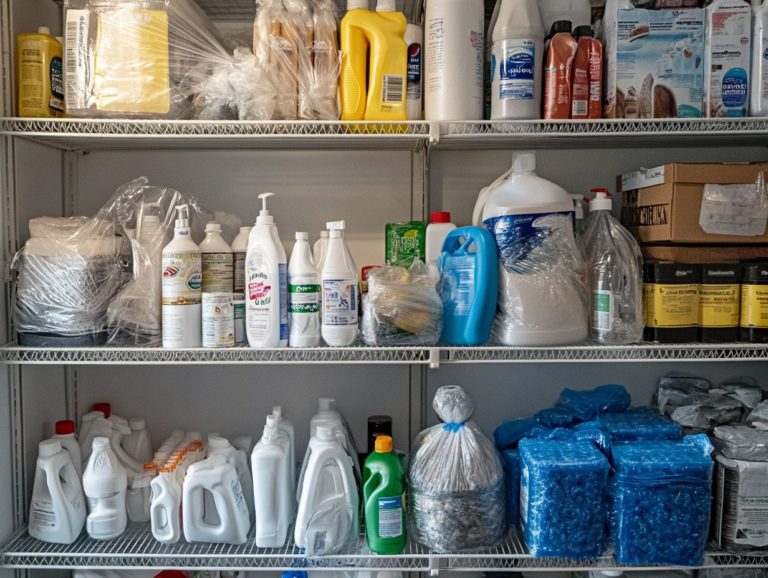How to Store Your Cleaners to Ensure Safety
Proper storage of cleaning products is essential for ensuring a safe and healthy environment in your home. With the array of cleaning solutions containing potent chemicals at your disposal, improper storage can create hazardous situations that range from accidental poisoning to dangerous chemical reactions. This article delves into the significance of correctly storing your cleaners, highlighting the risks that come with carelessness, and outlining best practices for handling specific types of cleaning solutions.
It also provides insights into safe disposal methods and guidance on what to do in case of an emergency. Jump in now to make your cleaning routine safer and more effective!
Contents
- Key Takeaways:
- Why is Proper Storage of Cleaners Important?
- What are the Hazards of Improperly Stored Cleaners?
- Want to Keep Your Cleaning Supplies Safe and Effective? Here s How!
- What are the Best Practices for Storing Specific Types of Cleaners?
- 4. Disinfectants: Storage Tips and Cleaning Equipment
- How to Dispose of Old or Unused Cleaners Safely? Cleaning Guidance and Safety Tips
- What to Do in Case of Accidental Ingestion or Exposure to Cleaners? Emergency Response Protocols
- Frequently Asked Questions
- What are the potential dangers of improperly storing cleaners? Cleaning Hazards and Safety Tips
- How should I store my cleaners to ensure safety? Cleaning Systems and Storage Tips
- What is the best way to organize my cleaners? Cleaning Organization and Storage Solutions
- Can I Store Cleaners in My Garage or Shed? Storage Tips and Cleaning Advice
- Are There Any Specific Storage Requirements for Certain Types of Cleaners? Cleaning Requirements and Guidelines
- What Should I Do with Old or Unused Cleaners? Cleaning Disposal and Safety Guidelines
Key Takeaways:
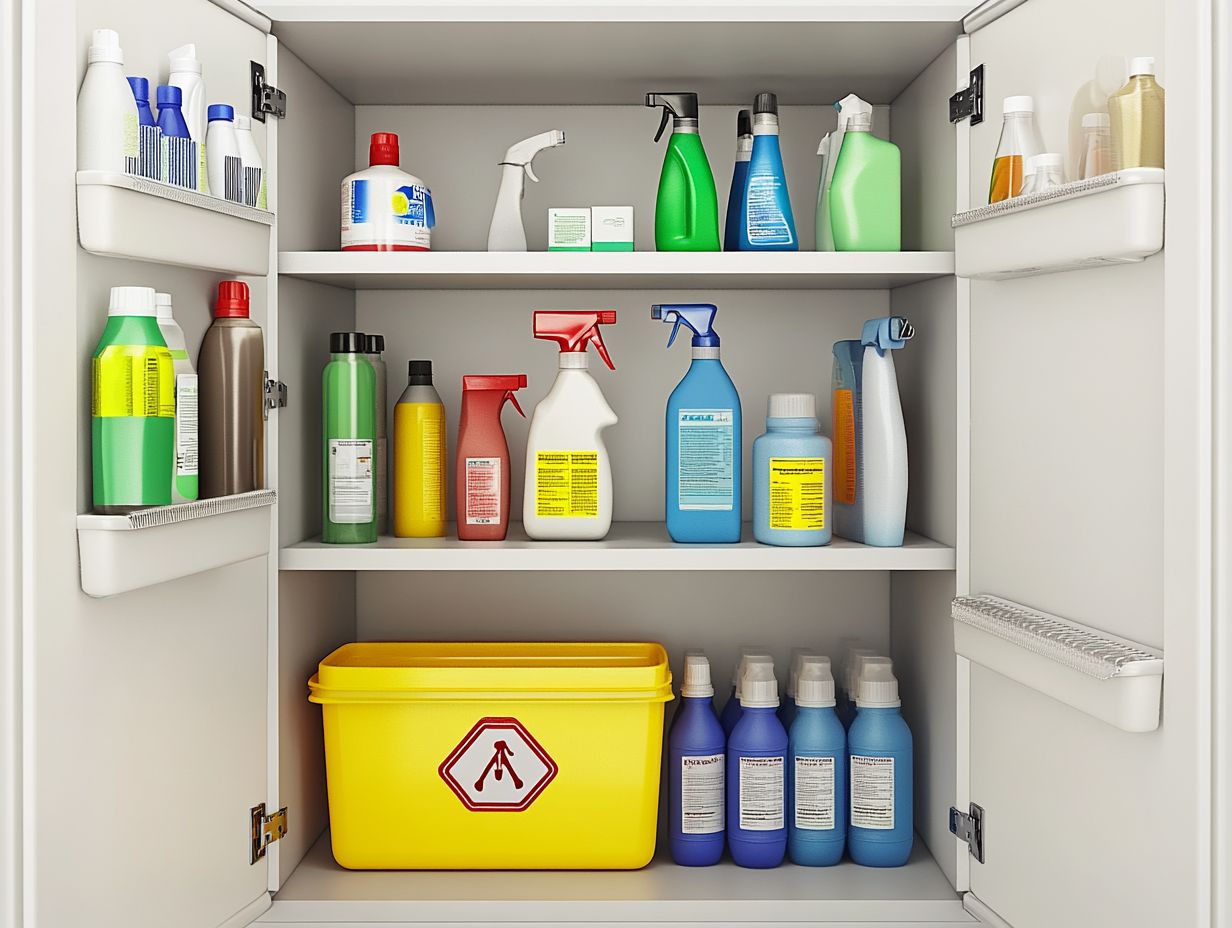
- Proper storage of cleaners is crucial for your safety and that of your family.
- Improperly stored cleaners can cause serious health issues.
- Keep cleaners in their original containers and out of children’s reach.
Why is Proper Storage of Cleaners Important?
Storing your cleaners properly is essential as it not only preserves the effectiveness of your cleaning products but also safeguards your household’s well-being. By organizing your cleaning supplies thoughtfully and adhering to safety guidelines, you can avert accidents related to harmful chemicals.
This practice is a cornerstone of effective housekeeping. Experts like Mary Cornetta of Sort and Sweet highlight the importance of cleaning organization in fostering a healthy home environment.
What are the Hazards of Improperly Stored Cleaners?
Improperly stored cleaners can present serious hazards, leading to potential accidents and health risks for everyone in the household, including adults and children alike. When these products are not kept in their original containers or stored in unsuitable places, the risk of exposure to harmful cleaning chemicals rises significantly.
This carelessness can lead to dangerous situations, such as toxic fumes gases that can make you sick chemical burns, or even accidental poisoning, particularly jeopardizing child safety. Thus, understanding the nuances of cleaning hazards is essential for every household.
What are the Risks of Mixing Different Cleaning Solutions?
Mixing different cleaning solutions can lead to hazardous chemical reactions, which occur when two or more cleaning products are mixed and they change into a new substance. These reactions carry serious health risks. Many common cleaning products contain ingredients that, when combined, can create toxic fumes or dangerous substances, resulting in significant cleaning hazards within your home.
For example, mixing bleach with ammonia produces chloramine vapors, which can harm your respiratory system. This underscores the critical importance of understanding cleaning safety when using various products. Always follow professional organizing guidelines and reputable cleaning advice to ensure safety.
Another instance is the combination of baking soda and vinegar. While this duo is often celebrated as a natural cleaning solution, it can sometimes lead to excessive fizzing and pressure buildup in closed containers. To steer clear of these risks, it s crucial to read product labels meticulously and only mix cleaning solutions when the manufacturer gives the green light.
Always ensure proper ventilation when using strong chemicals, and don t hesitate to wear gloves and a mask as a precaution. These safety tips are vital for maintaining a secure cleaning environment. By following these guidelines, you can effectively maintain a clean space while avoiding the dangers associated with chemical reactions.
Organize your cleaning routines to incorporate these guidelines for optimal safety and efficiency.
Want to Keep Your Cleaning Supplies Safe and Effective? Here s How!
Mastering proper storage techniques is key. Begin by designating a specific area that is cool, dry, and securely out of reach of children and pets for your cleaning products.
Opt for clear storage solutions to easily see what you have, promoting efficient cleaning routines. Implementing these streamlined systems elevates your cleaning practices and aligns with expert recommendations on organization and safety.
1. Keep Cleaners in Their Original Containers
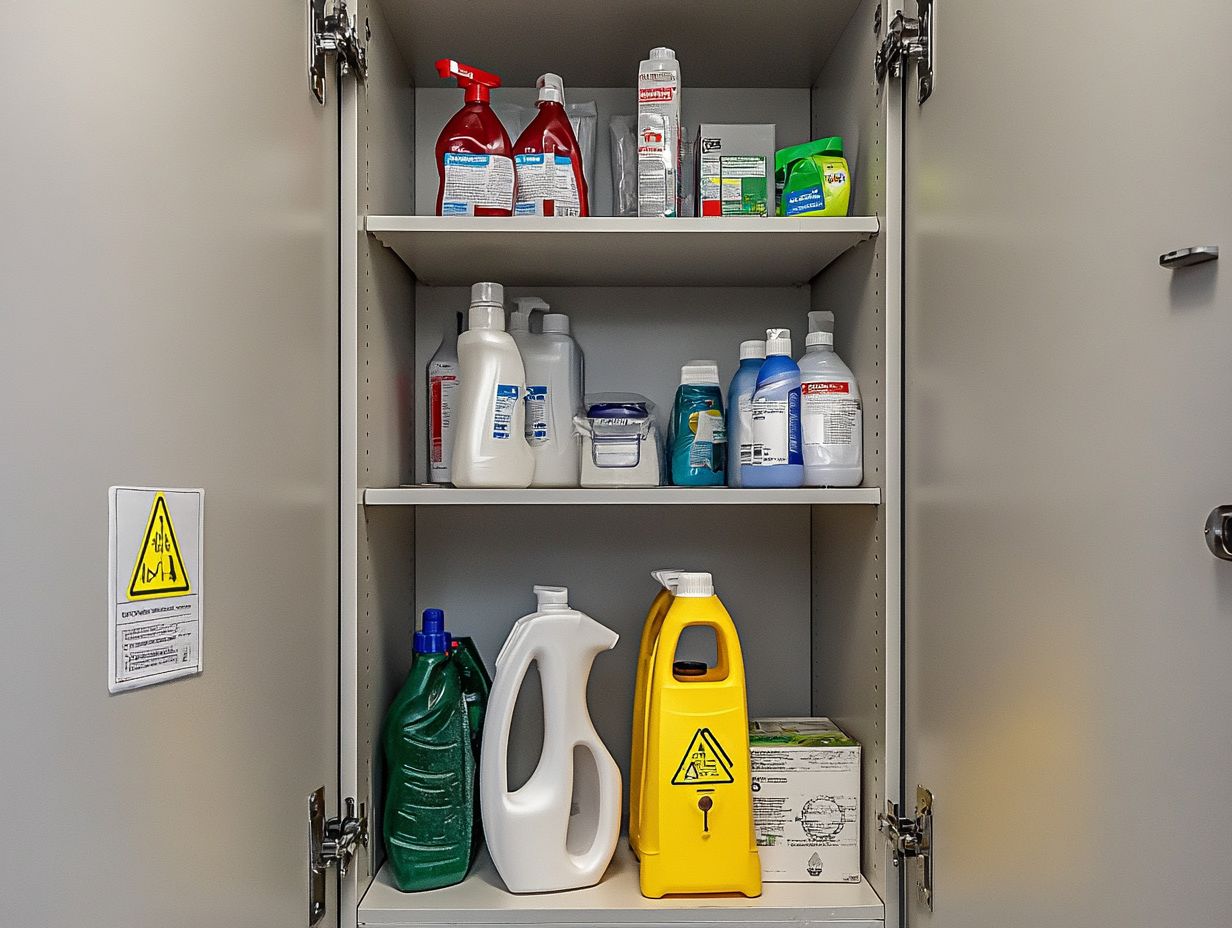
Keeping cleaners in their original containers maintains their efficacy and ensures your safety. Those containers often contain vital information such as safety warnings, usage instructions, and a list of ingredients this knowledge is essential for informed use.
This practice helps you keep your cleaning supplies organized, making it easy to identify products and reducing the risk of mixing incompatible chemicals.
Using these designated containers significantly reduces the chances of accidental spills or misuse since the labeling clearly indicates what s inside and highlights any potential hazards. Embracing this method fosters a safer cleaning environment and enhances cleaning efficiency everything is right where it should be.
By using original containers, you prevent confusion and ensure that each cleaner is used correctly. This leads to effective cleaning results while prioritizing your overall safety.
2. Store in a Cool, Dry Place
Store your cleaning supplies in a cool, dry place to preserve their effectiveness and prevent breakdown of chemicals. Extreme temperatures or humidity can alter the composition of these products, leading to diminished performance or even hazardous reactions. Following this storage technique enhances your cleaning methods while ensuring the safe usage of your supplies over time.
Maintain optimal conditions to ensure cleaning product effectiveness, as fluctuations can cause essential ingredients to break down rapidly. For example, excessive heat may lead to evaporation of active compounds, while high humidity can encourage mold growth in certain products. Always store cleaning supplies in appropriate conditions to ensure their longevity.
To further promote safety, consider using sealed containers or ventilated cabinets to minimize exposure to environmental variables. Organize your cleaning supplies away from direct sunlight and extreme temperature variations to help retain their integrity. These tips are key to effective housekeeping practices.
Act now to keep your cleaning products effective and safe for every use! Following these strategies significantly enhances your cleaning methods.
Start organizing your cleaning supplies today for a safer, more effective cleaning routine!
3. Keep Out of Reach of Children and Pets
To maintain the safety of your children and prevent accidents, it’s essential to keep all cleaning supplies well out of reach. Organize your cleaning products in locked cabinets or on high shelves to minimize risks.
This proactive strategy protects your family and allows you to maintain effective cleaning routines without the looming threat of exposure to harmful chemicals. Prioritizing child safety and proper storage solutions is crucial for home organization.
Using childproof locks on cabinets can further enhance safety, ensuring that even the most curious hands can’t easily access potentially dangerous substances. If you have both children and pets in your home, think about utilizing storage bins with tight-fitting lids and placing them in areas that are hard to reach.
Regularly review your cleaning supplies and keep only the essentials on hand to significantly reduce the chances of accidents. Teach older children to stay away from cleaning products to reinforce their role in household safety and cultivate a sense of responsibility.
By following these tips, you can enjoy safer and more effective cleaning practices that keep your home sparkling!
4. Use Proper Labels and Warnings
Label your cleaning products now for a safer home! Using proper labels and warnings on cleaning products is crucial for ensuring both safety and effectiveness. Clear labeling provides essential information about the contents, usage instructions, and potential hazards associated with various cleaning chemicals.
This practice helps you organize your supplies and supports knowledge-based decision-making during cleaning routines, ultimately contributing to a safer home environment. These guidelines are fundamental to maintaining order and safety at home.
Labeling enhances organization while significantly reducing the risk of accidents and misuse. A well-placed label can indicate necessary safety precautions, whether the product is toxic, flammable, or requires protective gear during application.
Adhering to health and safety regulations ensures you are well-informed about the products you use. By including key information such as expiration dates, mixing instructions, and first-aid measures (instructions for treating injuries), you can avoid potentially hazardous situations.
Implementing proper labeling practices instills a sense of responsibility, empowering you to recognize the importance of handling cleaning supplies with care and maintaining a safe and orderly living space. Are your cleaning products labeled correctly? Check them today!
What are the Best Practices for Storing Specific Types of Cleaners?
Different types of cleaners necessitate specific storage practices to guarantee their effectiveness and safety. By adhering to best practices for storing various cleaning products such as bleach, ammonia, and disinfectants you can prevent hazardous chemical reactions and ensure each product remains fit for its intended use.
Use storage tips and cleaning strategies provided by experts for optimal results. Employing proper storage techniques and mastering the cleaning methods tailored to each product will elevate both the safety and efficiency of your cleaning routines.
- Store bleach and ammonia separately to prevent toxic reactions.
- Keep disinfectants in a cool, dry place to maintain their effectiveness.
- Label and date all cleaning supplies for easy tracking.
By following these best practices, you can ensure that your cleaning supplies are well-maintained and ready for use.
1. Bleach: Safety Tips and Storage Solutions
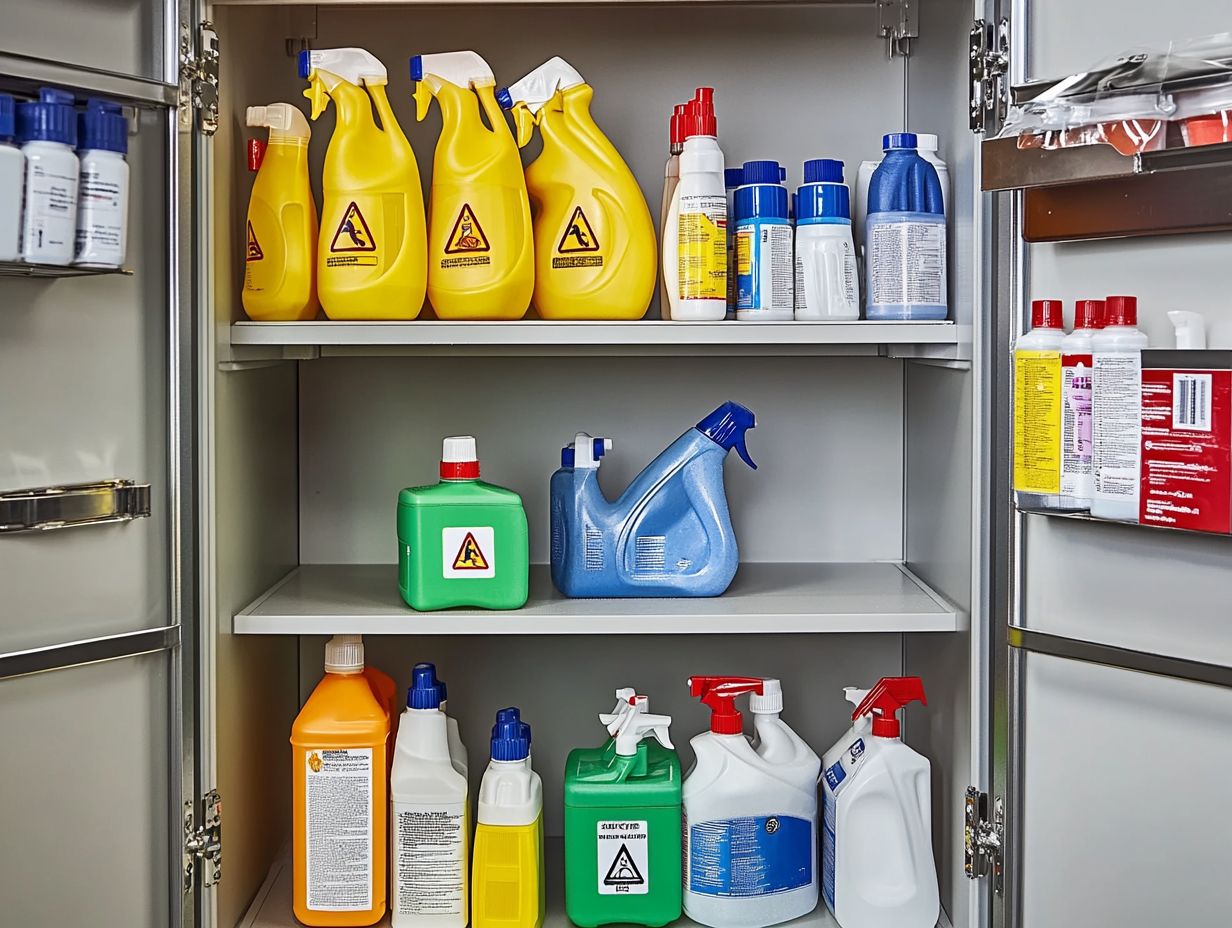
When storing bleach, keep it tightly sealed in its original container. This prevents spills and maintains its potency. Place bleach in a cool, dry location away from direct sunlight to avoid degrading its cleaning properties. Always label it clearly for safety.
Store bleach out of reach of children and pets, making safety your top priority. Use storage solutions like a locked cabinet or a high shelf to greatly diminish the chances of unauthorized access. Child safety should always be a focus when handling any cleaning chemicals.
Be mindful of storing bleach separately from other household chemicals, as certain combinations can result in hazardous reactions. Check your storage area for leaks or damage regularly to keep everyone safe! Being aware of your cleaning products is critical to preventing dangerous accidents.
Follow these practices to make your bleach use safe and effective! Ensure you follow cleaning guidelines to keep your space safe and clean.
2. Ammonia: Cleaning Tools and Techniques
You should store ammonia in a well-ventilated area, away from any heat sources, to prevent hazardous reactions. Keep ammonia in its original container and seal it tightly to stay safe and effective. Clear labeling is crucial, especially to avoid any accidental mixing with bleach or other incompatible cleaning products.
Proper storage involves more than just sealing and labeling; make sure the container is stored upright in a designated area to prevent spills or leaks. It s also vital to keep ammonia out of reach of children and pets, using safety locks on cabinets if necessary. Regular checks for leaks as part of your cleaning routines are highly recommended.
When you use ammonia-based products for cleaning, remember to wear protective gloves and eyewear to minimize skin and eye exposure. Always work in a well-ventilated space to avoid buildup of fumes, and exercise caution when combining ammonia with other chemicals, as this can lead to dangerous reactions. Follow safety guidelines to avoid accidents.
3. Vinegar: Natural Cleaning Solutions
Vinegar, your go-to natural cleaning solution, deserves a spot in a cool, dark place to maintain its potency and prevent any degradation. While it s generally safe, adopt proper cleaning techniques by keeping it tightly sealed and clearly labeled, ensuring there’s no mix-up with other cleaning products.
The acetic acid in vinegar not only grants it formidable antibacterial properties but also makes it essential for conquering stubborn stains and odors. As you integrate this versatile cleaner into your daily routines, it s essential to steer clear of mixing it with bleach or ammonia, as this can unleash harmful fumes.
For a sparkling kitchen or bathroom, consider a straightforward blend of vinegar and water in a spray bottle it s a fantastic solution. Just remember to test any surfaces first to avoid unintended damage. Additionally, ensuring good ventilation while you clean will enhance safety, creating a pleasant and effective cleaning experience.
Start implementing these tips today for a safer home!
4. Disinfectants: Storage Tips and Cleaning Equipment
Store disinfectants at room temperature, in a dry place, and away from direct sunlight to maintain their effectiveness. Always keep disinfectants in their original containers for safety and effectiveness. Clear labels help prevent misuse and enhance safety during your cleaning routines.
Make sure to keep these products away from extreme temperatures, whether it s freezing cold or excessive heat. Such conditions can degrade their chemicals and diminish their germ-killing capabilities. Professional organizing advice from experts like Mary Cornetta can help maintain optimal storage conditions.
Clear and accurate labeling isn t just about being organized; it s a crucial aspect of safety. It ensures that anyone handling these products is aware of potential hazards and knows the appropriate usage instructions. Home organization tips can include proper labeling and storage techniques to enhance safety.
Store disinfectants out of reach of children and pets to significantly reduce the risk of accidental exposure or ingestion. By implementing these best practices, you not only protect the integrity of your cleaning agents but also contribute to a safer cleaning environment. Understanding the importance of proper cleaner storage can enhance your safety measures. Cleaning recommendations from organizations like the National Capital Poison Center can provide further safety insights.
How to Dispose of Old or Unused Cleaners Safely? Cleaning Guidance and Safety Tips
Dispose of old or unused cleaners safely to protect our environment and your family! Many cleaning products harbor harmful chemicals that necessitate careful handling and disposal in accordance with local regulations. Cleaning awareness and adherence to safety tips can mitigate these risks.
By employing proper disposal methods, you not only adhere to cleaning safety guidelines but also contribute to community well-being and safeguard the environment from hazardous waste. Cleaning knowledge on disposal can make a significant impact.
What to Do in Case of Accidental Ingestion or Exposure to Cleaners? Emergency Response Protocols
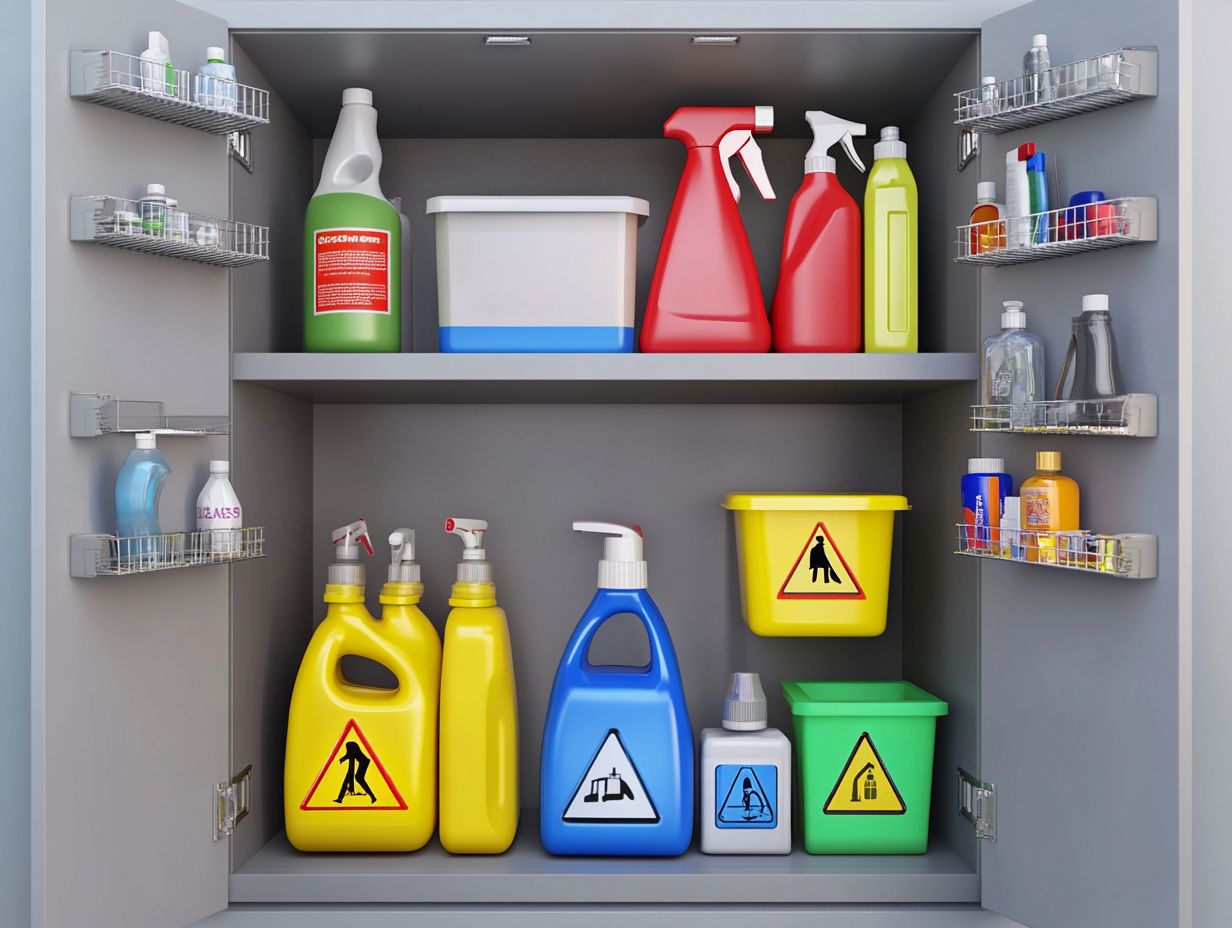
In the unfortunate event that you accidentally ingest or come into contact with cleaning chemicals, taking immediate action is crucial for your safety and to avert serious health implications. Following cleaning safety tips can minimize the impact of such incidents.
It is imperative to adhere to emergency response protocols, which may involve reaching out to poison control or seeking medical assistance, depending on the severity of the exposure. Cleaning resources from the National Capital Poison Center can provide vital information in these situations.
Being well-informed about cleaning safety can profoundly influence the outcome in these critical situations. Cleaning guidance and professional organizing can help prevent such accidents.
Frequently Asked Questions
What are the potential dangers of improperly storing cleaners? Cleaning Hazards and Safety Tips
Improperly stored cleaners can pose a threat to the health and safety of yourself and others. They can release harmful fumes or cause chemical reactions, leading to potential accidents or injuries. COVID-19 has highlighted the importance of proper cleaning practices and storage.
How should I store my cleaners to ensure safety? Cleaning Systems and Storage Tips
Cleaners should be stored in a cool, dry place away from direct sunlight. It is important to keep them out of reach of children and pets to avoid accidental ingestion or contact. Organize supplies to ensure they are easily accessible but safe.
What is the best way to organize my cleaners? Cleaning Organization and Storage Solutions
It is recommended to group cleaners by type and purpose, such as all-purpose cleaners, bathroom cleaners, and laundry detergents. This will make it easier to locate and use the specific cleaner you need, and also prevent potential chemical reactions. Cleaning recommendations from professionals like Mary Cornetta of Sort and Sweet can help streamline your cleaning organization.
Implementing these safety and organization tips can help maintain a clean, safe environment for you and your family!
Can I Store Cleaners in My Garage or Shed? Storage Tips and Cleaning Advice
It is not recommended to store cleaners in areas that are not temperature controlled, such as garages or sheds. Extreme heat or cold can cause changes in the chemical composition of cleaners, making them less effective and potentially hazardous. Cleaning challenges like these require specific storage solutions to maintain safety.
Are There Any Specific Storage Requirements for Certain Types of Cleaners? Cleaning Requirements and Guidelines
Yes, certain cleaners may have specific storage requirements due to their chemical composition. For example, bleach should always be stored in a cool and well-ventilated area and should never be mixed with other cleaners. Cleaning practices should be followed as per COSHH regulations to ensure safety.
What Should I Do with Old or Unused Cleaners? Cleaning Disposal and Safety Guidelines
Properly dispose of old or unused cleaners by following the instructions on the label. Do not pour them down the drain or throw them in the trash. Contact your local waste management facility for guidance on safe disposal methods. Cleaning advice from New York University and Rutgers University emphasizes the importance of adhering to local disposal regulations.

